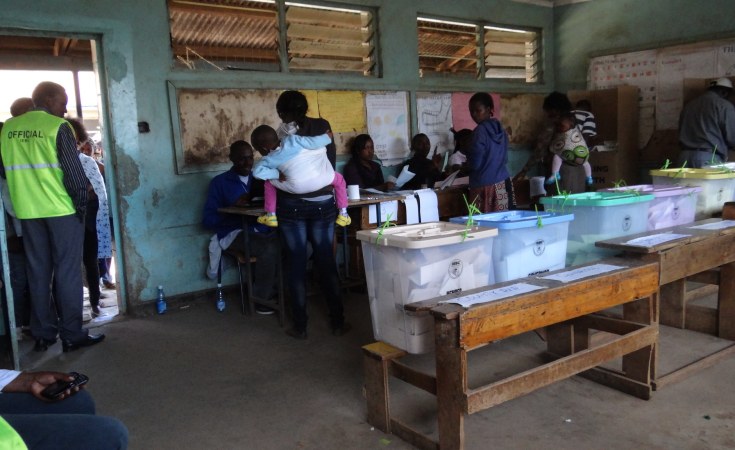As Kenyans prepare to participate in the August 9 General Election, all eyes are now on the Independent Electoral and Boundaries Commission to deliver a free, fair and verifiable election.
The bitter memories of the 2017 presidential election circus are still fresh in our minds, after the Supreme Court nullified results of the presidential election, citing irregularities, and ordered a fresh one within 60 days. IEBC had declared incumbent President Uhuru Kenyatta the winner by a margin of 1.4 million votes against Raila Odinga.
The then Chief Justice David Maraga and the Supreme Court ruled that the disputed presidential election had not been "conducted in accordance with the constitution" and declared it "invalid, null and void". The verdict was backed by four of the six Supreme Court judges.
The verdict forced the IEBC to conduct a repeat presidential election which was boycotted by Odinga, the main Opposition candidate leading to an easy win by President Kenyatta.
The country lost billions of shillings due to the repeat polls which also led to stagnation of the economy due to the disruption the elections and prolonged period of campaigns for the repeal election.
Raila who was then the leader of the main opposition coalition, The National Super Alliance was then sworn in as the "People's President" three months after he boycotted a presidential election re-run. The opposition then called for boycott of products by firms believed to be associated with the Jubilee regime and NASA also demanded cessation of the Western part of Kenya from the rest of the country.
However, President Uhuru Kenyatta managed to steer the nation out of the post-election crisis after he initiated the handshake between him and opposition leader Raila Odinga. The handshake managed to bring growth and stability across Kenya after the post-election turmoil.
With just days to another general election, the IEBC has the mandate to conduct a free, fair and verifiable election that will not be challenged at the Supreme Court like the 2017 contested presidential poll that negatively affected our economy and social fabric.
The 2010 Kenyan Constitution was hailed us one of the best constitutions globally due to it's commitment to freedom, democracy and the respect for the rule of law. Kenyans have the powers to determine the destiny of the nation through peaceful and democratic elections through the ballot.
Kenya has achieved significant democratic progress since independence, and the world will be watching eagerly as Kenyans showcase the strength of their democracy on Election Day. A peaceful election that reflects the will of the Kenyan people will further cement Kenya's role as a cornerstone of democracy. A peaceful transition of power from President Uhuru Kenyatta to a new regime will enable Kenya to reach new heights as a regional and global leader as we seek to address the challenges facing Kenyans at the moment among them the high cost of living.
The IEBC has had five years to prepare for the 2022 general election and the transmission of results issues that led to the nullification of the 2017 Presidential elections should never be issue in the 2022 polls.
Chairman Wafula Chebukati and his team must ensure that key polling data and information is available to all the Presidential candidates, the media and observers to ensure the Commission gains the trust of all Kenyans.
The introduction of the new technology to identify voters and tally results poses a great challenge. In addition, the electronic voter identification system may as well tend to breakdown occasionally and the use of manual register as an alternative should be encouraged to ensure all Kenyans are free to vote despite the technological challenges.
The Commission should also clearly publish how many polling stations there are and where the 6,000 new ones are located. Another grey area is the voter register audit report which was done by KPMG but the Commission is yet to make public the new voters register after implementation of the audit report.
After the audit IEBC announced that at least 1.18 million voters will be knocked off the register. This is after a preliminary audit report by KPMG revealed several anomalies in the 22.5 million raw database of registered voters.
The number includes 246,465 dead voters, 481,711 voters who have been registered more than once as well as 226,143 voters who were registered with identity cards that do not validly belong to them.
In order for the IEBC to guarantee Kenyans a free, fair and transparent elections as envisaged in the constitution 2010, all the laws governing our elections must be strictly adhered to. All observers and the media should also be well briefed on the measures put in place to safeguard the transmission of the election results to avert another crisis.
The Mission of the IEBC is to "conduct transparent, efficient, and impartial elections; and undertake boundary delimitation for equitable representation and sustainable democracy". Kenyans are now watching keenly if the Commission will live to it's expectations or whether the Chebukati team will bungle the elections once again.
The writer is a communication consultant with 16 years of experience in media and public communication


